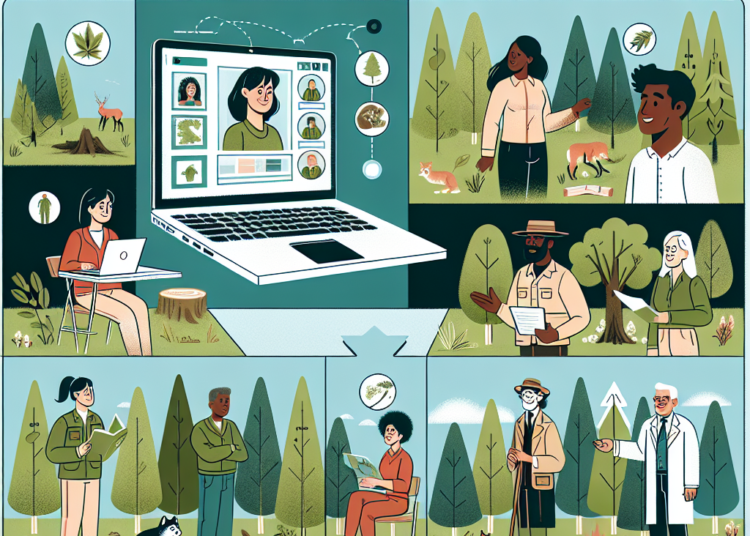Online Forestry Degree. A forestry degree focuses on the study of forest ecosystems, conservation, and management. It equips students with the knowledge and skills needed to manage forest resources sustainably. This includes understanding tree biology, soil science, wildlife habitats, and the impact of human activities on forest environments. Students learn to apply ecological principles in the field, ensuring that forests are maintained not only for their economic value but also for their ecological and recreational benefits.
The curriculum typically includes an interdisciplinary approach, incorporating elements of biology, environmental science, and public policy. Graduates are prepared to tackle complex issues such as deforestation, climate change, and biodiversity loss. They learn to balance the needs of human development with the preservation of natural habitats, making them vital contributors to both local and global environmental efforts.
Why Choose an Online Forestry Degree?

Flexibility and Convenience
One of the most significant advantages of an online forestry degree is the flexibility it offers. Whether you have a full-time job, family commitments, or other responsibilities, online programs allow you to study at your own pace and schedule. This flexibility ensures that you can balance your personal and professional life while advancing your education. Unlike traditional programs that require a physical presence, online education breaks down geographical barriers, enabling students from diverse backgrounds to pursue their academic goals.
Moreover, online forestry programs often incorporate interactive technologies, such as virtual labs and field simulations, to provide a comprehensive learning experience. These tools allow students to gain practical insights and apply theoretical knowledge in a simulated environment, bridging the gap between online learning and hands-on experience.
Access to Diverse Programs
Online forestry degree programs provide access to a wide range of courses from institutions around the world. This diversity allows you to choose a program that best aligns with your career goals and interests, without the constraints of geographical location. Whether you are interested in tropical forestry, urban forestry, or conservation policy, you can find a specialized program that caters to your aspirations.
In addition, online platforms often facilitate collaboration among students from different cultures and regions, enriching the educational experience. Engaging with peers from various backgrounds can enhance your understanding of global forestry issues and prepare you for a career in an increasingly interconnected world.
Cost-Effective Education
Online programs can often be more affordable than traditional on-campus degrees. You save on commuting costs, housing, and sometimes even tuition fees. Additionally, many online programs offer digital resources, reducing the need for expensive textbooks. This cost-effectiveness makes higher education more accessible to a broader audience, enabling more individuals to pursue their passion for forestry.
Furthermore, many online programs offer flexible payment options and financial aid opportunities, making it easier for students to manage their educational expenses. The ability to work while studying also allows students to offset costs, providing a practical solution for those balancing financial obligations with academic pursuits.
Core Subjects in an Online Forestry Degree

While each program may have unique offerings, there are common subjects you’ll encounter in an online forestry degree:
Forest Ecology and Management
Understanding the interactions within forest ecosystems is crucial. Courses in forest ecology cover topics like biodiversity, ecosystem functions, and the impact of climate change on forests. Students learn to analyze ecological data, assess the health of forest ecosystems, and develop management plans that promote sustainability.
These courses also explore the role of forests in sequestering carbon and mitigating the effects of climate change. By understanding these complex interactions, students are better equipped to make informed decisions that balance environmental, economic, and social considerations.
Conservation Biology
This subject focuses on preserving biodiversity and understanding the role of forests in global ecosystems. It covers strategies for protecting endangered species and managing natural resources sustainably. Students explore the principles of conservation genetics, habitat restoration, and invasive species management, equipping them with the tools to address pressing environmental challenges.
Conservation biology also emphasizes the importance of community involvement and stakeholder collaboration in conservation efforts. Students learn to develop and implement conservation plans that incorporate the perspectives and needs of local communities, ensuring long-term success and sustainability.
Forest Economics and Policy
Forestry professionals must understand the economic and policy aspects of forest management. Courses in this area explore the economic value of forests, resource allocation, and the impact of policies on forest conservation. Students analyze the implications of forestry-related policies and legislation, assessing their effectiveness in promoting sustainable practices.
By studying forest economics, students gain insights into the financial aspects of forestry projects and learn to advocate for policies that balance economic growth with environmental stewardship. This knowledge is crucial for influencing decision-making processes and promoting sustainable development at local, national, and international levels.
Wildlife Management
Forests are home to diverse wildlife species. Studying wildlife management involves learning about habitat conservation, species monitoring, and the impact of human activities on wildlife. Students examine the ecological requirements of different species and develop management strategies that enhance habitat quality and biodiversity.
Wildlife management courses also address the challenges of human-wildlife conflicts, exploring solutions that promote coexistence and minimize negative impacts. By understanding the intricate relationships between wildlife and their habitats, students contribute to the preservation of biodiversity and the health of forest ecosystems.
Career Opportunities with a Forestry Degree Online
An online forestry degree opens doors to various career paths, each contributing to the sustainable management of forest resources.
Forest Ranger
Forest rangers are responsible for protecting and managing public lands, ensuring the safety of visitors, and enforcing environmental regulations. They play a crucial role in preserving natural habitats and educating the public about conservation. As stewards of the land, forest rangers monitor ecosystems, conduct educational programs, and respond to emergencies, making a tangible impact on the preservation of natural resources.
Working as a forest ranger often involves collaboration with other agencies and stakeholders to develop management plans that balance recreation, conservation, and resource use. This role requires strong communication skills, a passion for the outdoors, and a commitment to environmental stewardship.
Conservation Scientist
Conservation scientists work to improve land use practices, prevent soil erosion, and protect water resources. They collaborate with landowners, government agencies, and other stakeholders to develop sustainable land management plans. By conducting research and analyzing ecological data, conservation scientists provide insights that guide the sustainable use and conservation of natural resources.
This career path offers opportunities to influence environmental policy, advocate for conservation initiatives, and contribute to the development of innovative strategies that address environmental challenges. Conservation scientists play a vital role in ensuring that ecosystems are managed sustainably for future generations.
Environmental Consultant
Environmental consultants assess the environmental impact of construction projects, industrial activities, and land development. They provide recommendations to minimize environmental damage and ensure compliance with regulations. This role involves conducting site assessments, preparing environmental impact reports, and advising clients on best practices for environmental management.
Environmental consultants often work with a diverse range of clients, including corporations, government agencies, and non-profit organizations. Their expertise in environmental science and policy enables them to offer solutions that balance development needs with environmental protection, contributing to sustainable growth and compliance with environmental standards.
Urban Forester
Urban foresters manage and maintain trees in urban settings, ensuring that city landscapes are healthy and sustainable. They work with city planners and local governments to integrate green spaces into urban development plans. Urban foresters assess the health of urban trees, develop management plans, and implement initiatives that enhance the quality of urban environments.
In addition to improving air quality and reducing urban heat, urban foresters contribute to the well-being of city residents by providing aesthetic and recreational benefits. This career path offers opportunities to shape urban landscapes, promote environmental sustainability, and enhance the quality of life in urban areas.
Choosing the Right Online Forestry Program

Selecting the right online forestry degree program is crucial to your success. Here are some factors to consider:
Accreditation
Ensure that the program you choose is accredited by a recognized accrediting body. Accreditation guarantees that the program meets specific educational standards and that your degree will be respected by employers. It also ensures that the curriculum is regularly reviewed and updated to reflect current industry standards and practices.
Accredited programs often have established relationships with industry partners, providing students with opportunities for internships, fieldwork, and networking. This recognition can enhance your career prospects and provide you with a competitive edge in the job market.
Curriculum
Review the program’s curriculum to ensure it covers the subjects you’re interested in and aligns with your career goals. Look for programs that offer a balance of theoretical knowledge and practical skills. A comprehensive curriculum should include core subjects such as ecology, conservation, and policy, as well as electives that allow you to specialize in your area of interest.
Consider programs that incorporate experiential learning opportunities, such as fieldwork, internships, and research projects. These experiences provide valuable hands-on training and allow you to apply your knowledge in real-world settings, preparing you for a successful career in forestry.
Faculty Expertise
Investigate the qualifications and experience of the faculty members. Faculty with industry experience and academic credentials can provide valuable insights and mentorship throughout your studies. Look for programs with faculty who are active in research, professional organizations, and industry collaborations, as they can offer current perspectives and connections.
Faculty expertise can significantly impact your learning experience and provide you with the guidance needed to succeed in your studies and career. Engaging with knowledgeable and experienced instructors can enhance your understanding of complex topics and inspire you to pursue your passions in forestry.
Student Support Services
Consider the level of support provided to online students. This includes access to academic advisors, technical support, and career services. A program that offers robust support can enhance your learning experience and help you succeed. Look for programs that provide resources such as online libraries, tutoring services, and career counseling to assist you throughout your academic journey.
Strong student support services can also facilitate your transition from education to employment, offering guidance on job searches, resume building, and interview preparation. By choosing a program with comprehensive support, you can maximize your educational experience and achieve your career goals.
Advancing Your Career with a Forestry Degree Online

An online forestry degree not only provides you with the knowledge and skills needed to succeed in the field but also offers opportunities for career advancement.
Networking Opportunities
Many online programs offer networking opportunities with fellow students, faculty, and industry professionals Online Forestry Degree. Engaging with this community can provide valuable connections and insights into the forestry industry. Networking can lead to collaborations, job opportunities, and mentorship, enhancing your professional growth and development.
Participating in online forums, webinars, and industry events can help you stay informed about the latest trends and developments in forestry. Building a strong professional network can open doors to new opportunities and provide support as you navigate your career path.
Continuing Education
Forestry is a dynamic field with ongoing advancements in technology, policy, and conservation strategies. An online degree can serve as a stepping stone for further education and specialization, keeping you at the forefront of industry developments. Pursuing advanced degrees or certifications can enhance your expertise and open up leadership opportunities in your chosen field Online Forestry Degree.
Continuing education also allows you to adapt to changing industry demands and explore emerging areas of interest. By staying current with the latest research and innovations, you can position yourself as a leader in the field and contribute to the advancement of forestry practices.
Leadership Roles
With a solid foundation in forestry, you can pursue leadership roles in organizations focused on environmental conservation, policy development, and sustainable resource management Online Forestry Degree. These roles often involve strategic planning, decision-making, and collaboration with diverse stakeholders to achieve conservation goals.
Leadership positions offer the opportunity to influence policies, drive sustainable initiatives, and make a meaningful impact on environmental conservation. By developing your leadership skills and expertise, you can play a pivotal role in shaping the future of forestry and contributing to a more sustainable world.
Online Forestry Degree
Online Forestry Degree. Pursuing an online forestry degree is an excellent choice for those passionate about nature and committed to environmental conservation. With flexibility, diverse program offerings, and a wide range of career opportunities, an online forestry degree can help you achieve your professional goals while making a positive impact on the world. The ability to study remotely and access a global network of resources and experts makes online education an appealing option for aspiring forestry professionals.
Whether you’re just starting your career or looking to advance in your current role, exploring online forestry degree programs today can set you on a path toward a fulfilling and meaningful career in forestry. Embrace the chance to combine your love for nature with your academic pursuits, and join a community of like-minded individuals dedicated to preserving our planet’s vital natural resources.




